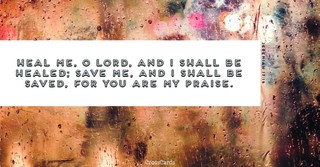- Recent Translations
- All Translations
Jeremias 17:14
Share
Settings
Jeremias 17:14 Meaning and Commentary
Heal me, O Lord, and I shall be healed
These are the words of the prophet, sensible of his own sins and backslidings, and of the part which he himself had in these corrupt and declining times; and being conscious of his own impotency to cure himself; and being fully satisfied of the power of the Lord to heal him; and being well assured, if he was healed by him, he should be thoroughly and effectually healed; therefore he applies unto him. Sins are diseases; healing them is the forgiveness of them; God only can grant this: or this may have respect to the consolation of him, whose soul was distressed, grieved, and wounded, with the consideration of the sins of his people, and the calamities coming upon them on that account:
save me, and I shall be saved;
with a temporal, spiritual, and eternal salvation; save me from the corruptions of the times, from the designs of my enemies; preserve me to thy kingdom and glory; there are none saved but whom the Lord saves, and those that are saved by him are saved to a purpose; they can never perish:
for thou [art] my praise;
the cause of it, by reason of mercies bestowed; the object of it, whom he did and would praise evermore, because of his favours, particularly the blessings of healing and salvation by him; see ( Psalms 103:1-4 ) .
Jeremias 17:14 In-Context
The Brenton translation of the Septuagint is in the public domain.


